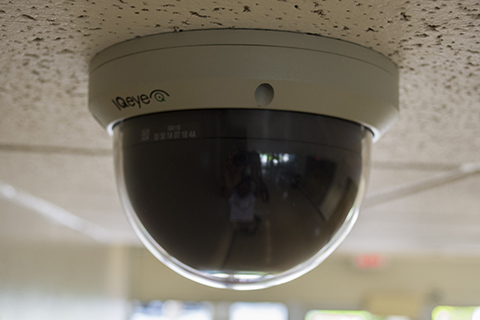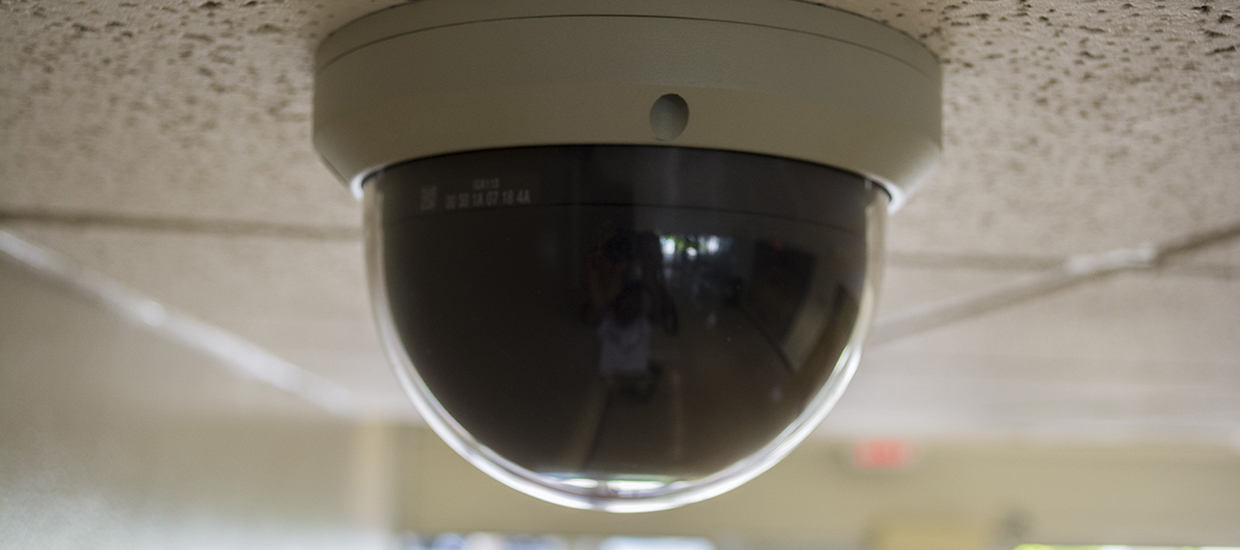Between the hours of 10:00 p.m. and 8:00 a.m., Security Assistants (student employees of the Department of Housing and Residential Life) monitor the entrance lobbies of the Residential Colleges. The duties of the Security Assistants include emergency response, oversight of fire and door prop alarm panels, access control to residential areas, and documentation of all nightly activity.
Additional components of Housing & Residenital Life's Safety & Security program are listed below.
Card Access System
The card access system acts as a front-line defense to help deter entrance into the Residential Colleges by unauthorized individuals. It is a major component of the University’s crime prevention efforts. All doors that permit access to the Residential Colleges are monitored by the card access system. In order to access the building, a resident must pass his/her Cane Card through the card reader, located next to the door (like the one pictured above). The card access system only permits residents and authorized personnel entry to the buildings.
Exterior Doors
Entrances to the Residential College common lobby areas remain unlocked from 7:00 AM to 10:00 PM; anyone may enter the front lobby areas during this time. From 10:00 p.m. to 7:00 a.m., these doors are locked and can only be accessed by residents and authorized personnel.
Interior Doors
Entrances into the residential areas of the Residential Colleges remain locked 24 hours a day, 7 days a week and can only be accessed by residents and authorized personnel.
Door Prop Alarms
Each Residential College is equipped with door prop alarms that monitor the status of all building entry doors. The system sounds an alarm whenever an equipped door is held open for longer than 60 seconds. In order to reset the alarm, the open door must be properly closed. This alarm panel continuously monitors the door status 24 hours a day, 7 days a week.
Administrative Video Monitors
The Residential Colleges are equipped with video cameras that monitor all points of entry. Everyone who enters or leaves the building is recorded. The cameras record 24 hours a day, 7 days a week.
Any images captured by the camera systems may be used as evidence of activity that violates the
Department of Housing & Residential Life and
University policies, including violations of access control policies.
Fire Alarm Systems
Each residential area is equipped with fire safety systems that warn residents whenever there is a threat of fire. When an alarm is triggered, a signal is sent immediately to the fire alarm panel located behind the area's front desk indicating the location of the potential hazard. Other components of the system include smoke detectors on every floor and in every room, fire sprinkler systems in all residential areas, fire alarm pull stations and fire extinguishers on every floor.
Daily Fire Safety Practices
The Department of Housing and Residential Life expects every employee, student, and guest to assist in maintaining an environment that is free of fire and evacuation hazards. The following information will help ensure fire prevention and safe evacuations.
- Respect the smoke-free campus policy, including within all Residential Colleges, the University Village and surrounding areas.
- Keep all exit corridors and stairwells clear at all times.
- Familiarize yourself with all exit locations and fire evacuation routes within your residential area.
- Do not prop open doors. These doors are designed to restrict the movement of fire and smoke within the building so that occupants can evacuate safely during an actual emergency.
- Report any unsafe condition or any malfunctioning safety equipment to your Residential College front desk.
Occupant Evacuation Procedures
There are penalties for vandalizing fire safety equipment or not responding to a fire alarm. If a fire is detected and the fire alarm has not been triggered, evacuate the area. Isolate the fire by closing doors as you leave. Do not attempt to extinguish fires unless you have been trained on the proper use of portable fire extinguishers and only as a last resort. Activate the nearest fire alarm, if it has not already been activated. Call 911 and report the fire by using a telephone in a safe area. Upon hearing a fire alarm, evacuate the building by stairs and exits. Do not use elevators. Once outside the building, move away from the building to clear access for the fire department and other emergency responders. Do not re-enter the building until explicitly told to do so by a University official.
Before opening a door of a room that leads to a main hallway, feel the door first to see if it is hot. If the door is not hot, open it slowly and follow the occupant evacuation procedures. If flames are obstructing your exit and/or smoke is too heavy, return to the room and close the door. Place a towel or article of clothing along the bottom edge of the door. Open the windows for fresh air and hang a sheet, or another comparable article, out the window to let the fire department know you are still inside.
- Evacuate in an orderly manner – don’t panic. Walk, don’t run.
- Obey the directions of your Residential College Professional Staff, RAs, DAs, Security Staff, & emergency response officials.
- Proceed down the stairwell in an orderly fashion, as fire rescue personnel may be coming up the same stairwell.
Mobility Imparied Students
The Department of Housing & Residential Life maintains an up-to-date list of individuals who may require assistance during an emergency evacuation. Housing and Residential Life staff will ensure that the Coral Gables Fire Rescue gets this list upon their arrival, and they will provide the necessary assistance to these students.
Courtesy/Emergency Telephone
Most card access doors are equipped with a phone for visitors to call those they wish to visit or to call the reception desk of the Residential Colleges. These phones are also equipped with a one-touch button that provides immediate contact with the University of Miami Police Department (UMPD).
Students encouraged to download the U Guaridan app, a free smartphone safety app that allows users to pre-register emergency information, utilize virtual trip safety escort, and a one touch call button to UMPD.
Student ID Cards (Cane 'Cards)
All UM students are required to carry their ‘Cane Card at all times. Between the hours of 10:00 p.m. and 7:00 a.m., no access will be granted to residents of a building without their ID. Students are not permitted to use the ID of other students to access a building. Violation of this policy will result in disciplinary follow-up with Housing & Residential Life Staff and/or potential fines added to the student's account.
Guest ID Policy
All visitors to campus (non-residents) will be required to sign-in when visiting one of the residential colleges. If a guest does not have an ID, they will not be permitted access to the building. All guests must be accompanied by a resident of the building they are visiting at all times, and residents accept responsibility for the actions of their guests.
Lockouts
A lockout, as the term implies, is when a resident gets locked-out of his/her room. This may happen because the card was lost, stolen, or left in the room. Please refer to the Guide to Living On Campus for more information regarding lockout proceudres.





